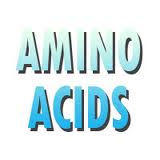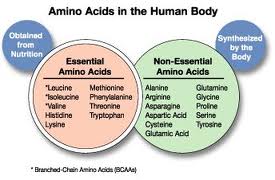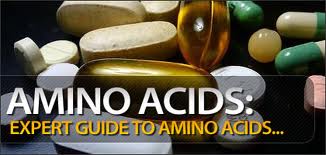Amino Acids
Amino Acids Supplements and Essential for a healthy Living
Amino Acids - Introduction

Amino acids are the building blocks for all life, also the chemical basis for all protein. Protein is one of the biggest components of our bodies. Our bodies use amino acids to form the proteins which build everything from muscles and bones, skin and hair, to internal organs and fluids. Besides building cells and repairing tissue, they form antibodies to combat invading bacteria & viruses; they are part of the enzyme & hormonal system; they build nucleoproteins (RNA & DNA); they carry oxygen throughout the body and participate in muscle activity.
Types of amino acids

There are about 20 natural amino acids. These can be divided into two basic groups: essential and non-essential. The essential amino acids are those which your body cannot produce. Your body only gets these through your diet. The nonessential amino acids are just as important, but your liver can manufacture them.
Facts about Amino acids
- All protein, 100%, is made up of amino acids... and proteins regulate nearly every biochemical reaction in the body.
- Amino acids account for 75% of dry body weight (total weight minus water weight).
- Most people get all the amino acids they need from the protein in their food. Protein deficiency is very rare.
- You need all twenty-two amino acids to make the 50,000-plus proteins you need for life.
- Amino acids make the many enzymes, hormones, neurotransmitters, and other chemical messengers that regulate your body.
- Some individual amino acids can help health problems, including heart disease, insomnia, and herpes.
- 100% of neurotransmitters, such as norepinephrine, serotonin, GABA, acetylcholine, aspartate, glutamate, are made of amino acids.
- 100% of hormones are made up of amino acids. Sex hormones are made up of amino acids plus fat or lipids.
- 100% of neuropeptides, the substances the brain releases with every thought, are amino acids.
- 100% of peptides are made up of amino acids.
- 95% of muscle is made up of amino acids.
- 95% of the heart is made up of amino acids.

Why amino acid supplements are important? - A CASE STUDY
It is difficult to prove why amino acid supplementation should become as routine as fluid replacement. Here is a case report that will help illustrate their importance in recovery:
Kristy M. is a 40 year old high-powered attorney, with a private practice and a job with the state. She is also a published author. She asked to be evaluated due to severe exhaustion that had been dogging her for the past six months. She has been physically active, jogging five miles a day. Somehow, she had time and energy to do it all. But she was terrified that life as she knew it was over.

Blood testing revealed that 40% of her amino acids were deficient. She was put on a nutritional program to correct her deficiencies. She returned to our office two weeks after starting on her program, for her first follow-up visit. Kristy was thrilled to announce that she felt great and that she was jogging two miles a day. In fact, her recovery started 48 hours after starting on the nutritional program provided by The Gersten Institute.
When evaluated two weeks later, her energy was even better, and she has continued to regain her health. This is indeed a fast response. Not many people begin a major turnaround within two days of beginning an amino acid program, but we see them.
When you see a "Kristy" and have the proof in your office and in your patient's life, you begin to understand why amino acid supplementation should be the next thing you receive . . . after water.
Where we can find amino acid supplements?

An essential amino acid supplement can be found in health food stores, or naturally from protein rich sources such as meat, fish, dairy products, and vegetables such as legumes, peas, and grains. Another great amino acid supplement is in the form of powder, which will help athletes build muscle and gain lean muscle weight.
Who needs it and what are some symptoms of deficiency?

Those who could benefit from amino acid supplementation are vegetarians, people with allergies, stress-related fatigue, or hypoglycemia.
Trouble digesting food could be a signal of a diminishment in the production of digestive enzymes. This could lead to poor nutrition because one's body cannot digest food at full capacity. In essence, one's body needs amino acids in order to get amino acids from food.
How much should be taken? Are there any side effects?

One and one-half grams of powder three times a day should be sufficient to provide the body with an adequate supply of available amino acids to assist in digesting food and bulking up. There are no side effects with proper supplementation.
AMINO ACID REFERENCE GUIDE
- ALANINE: Enhances immune system; lowers risk of kidney stones; aids in alleviating hypoglycemia.
- ARGININE: Increases sperm count; accelerates wound healing; enhances sexual performance in men; tones muscle tissue.
- ASPARAGINE: Promotes balance in the central nervous system.
- ASPARTIC ACID, BRANCHED CHAIN AMINO ACIDS (LEUCINE, ISOLEUCINE, VALINE): Enhances immune system; increases stamina and endurance; expels harmful ammonia from the body.
- CYSTEINE: Helps prevent baldness; alleviates psoriasis; improves condition of hair, skin and nails; promotes fat burning and muscle building. (Converts into cystine as needed.)
- CYSTINE: Aids in preventing side effects from chemotherapy and radiation therapy; reduces accumulation of age spots. (Converts into cysteine as needed.)
- GLUTAMIC ACID: Helps improve brain function; aids in metabolism of sugars and fats; useful in treatment of children's behavioral disorders, epilepsy, and muscular dystrophy. (Converts into glutamine as needed.)
- GLUTAMINE: Helps improve brain function; alleviate fatigue; aid in ulcer healing time; build and maintain muscle; elevate mood; reduce craving for sugar and alcohol. (Converts to glutamic acid in brain.)
- GLYCINE: Necessary for central nervous system function; aids in healing; helps treat stomach hyperacidity; prevent seizures. (Can be converted into serine in the body when needed.)
- HISTIDINE: Helps alleviate rheumatoid arthritis; alleviates stress; aids in improving libido.
- LYSINE: Helps improve concentration; enhances fertility; aids in preventing herpes simplex infection.
- METHIONINE: Aids in lowering cholesterol; helps in treatment of schizophrenia and Parkinson's disease; may protect against tumors.
- ORNITHINE: Works as a muscle-building hormone; increases potency of arginine.
- PHENYLALANINE: Acts as an antidepressant; helps suppress appetite; can function in some forms as a natural painkiller.
- PROLINE: Aids in wound healing; helps increase learning ability.
- SERINE: Helps alleviate pain; can act as a natural anti-psychotic.
- TAURINE: Helps strengthen heart function; may prevent macular degeneration; aids in digestion of fats and absorption of fat-soluble vitamins.
- THREONINE: Necessary for utilization of protein in diet; may provide symptomatic improvement in some patients with Lou Gehrig's disease, amytrophic lateral sclerosis (ALS).
- TRYPTOPHAN: Aids in reducing anxiety; helps induce sleep; may help in control of alcoholism.
- TYROSINE: Improves sex drive; helps alleviate stress; can act as an appetite suppressant and mood elevator.
